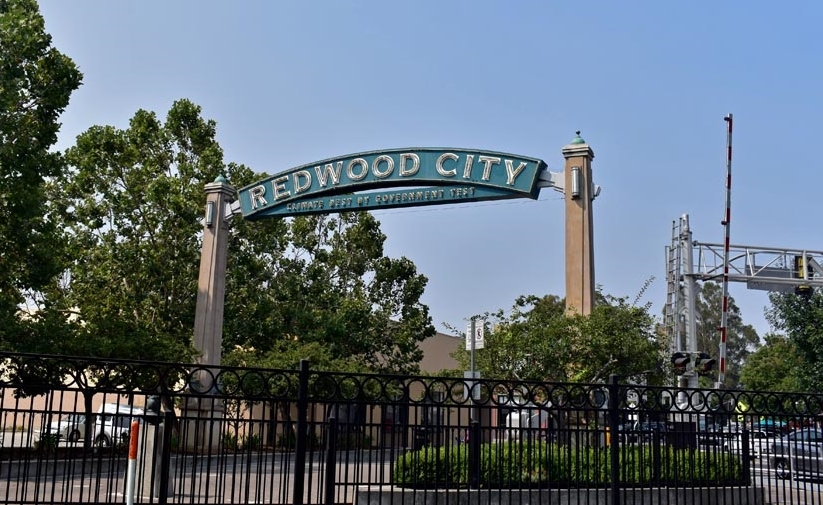Redwood City officials recently scoured city property, even parking lots, for land that can be converted to sorely needed parks and open space. The effort has a back-to-the future ring about it, recalling California Square, a downtown public plaza that was replaced by the San Mateo County Hall of Justice and Records. In retrospect, the swap seems enough to make someone “turn over in his grave,” which, in this case, it did. More about that later.
California Square’s history dated to 1854 when Simon Mezes, who played a large part in establishing Redwood City, donated a parcel of land across the street from the original courthouse for use as a public plaza. Mezes also donated land at Warren and Standish streets for a park dubbed Mezes Park, which is still in use, but is better known as “tank park” for the World War II tank that stands guard in the southwest corner. The two parcels of land are believed to be the first property in California donated for public use and recreation.
California Square, located north of Marshall Street between Hamilton and Winslow streets, resembled the familiar plazas favored in Spanish and Mexican towns; square-shaped with open space to host festivals and other public gatherings, or just a venue for simply walking or relaxing. Walkways radiated from the center where a flagpole stood. Trees, bushes and plants lined the perimeter.
The park was also called Native Daughters Park and with good reason. The Bonita Chapter of the Native Daughters of the Golden West obtained the park on loan from the city. Starting in 1901, the woman’s group raised more than $2,000 for plants, soil, trees, benches and the flagpole to establish Redwood City’s first city park. The park was returned to the city in 1911 and was enjoyed by citizens until it was replaced by the county structure in 1958.
A legal brief filed in the 1950s by San Mateo County District Attorney Louis Dematteis claimed pioneer residents of the county recalled that “farmers and lumbermen usually camped in California Square and kept and fed their horses there.” Dematteis wrote that “the square was fenced to prevent the horses from straying away.” This, the DA claimed, proved that “the property was used as the dedicators intended it should be – for county purposes.”
Despite the claims by the county, the city had great plans for the square. In 1944, the Redwood City Parks and Recreation Department unveiled plans to improve the square “in order to derive greater benefit from the very limited recreational areas now available.” Among other things, the plans envisioned a playground, benches and a band shell for evening and Sunday concerts. The proposals also called for a clock tower with chimes and “plaques commemorating outstanding events in the city’s history.” The dream never materialized.
The proposal brings us back to today’s aforementioned effort to develop additional parks. Current Park and Rec director Chris Beth reported that the City Council decided to develop the small Rosselli Garden located next to the main library on Middlefield Road along with part of the adjacent Main Street parking lot followed by “a linear trail along Redwood Creek to the Bay Trail.” Beth said the plan will “over time improve our public spaces.”
Mezes, who was the agent for the Arguello family of land grant fame, called for a townsite survey soon after the Arguello’s claims were approved by the Federal Land Commission. His hopes that the city would be called Mezesville were dashed by the town’s citizens who opted for Redwood City, a name that has stuck.
Mezes died in 1884 and was buried in a crypt at Union Cemetery. He bought the plot when the cemetery was organized in 1859. According to the Union Cemetery history association, his remains were removed in the mid-1950s by his descendants who “were justifiably angry at the County of San Mateo and the City of Redwood City because the entities were successful in having Mr. Mezes’ will broken in order to level California Square so that they could build the Hall of Justice and Records which stands on that spot today.”
The remains weren’t the only thing moved. So was the history marker at California Square, which today is displayed at Mezes Park. The plaque reads:
“In Memory of S. M. Mezes Founder of Mezesville Now Redwood City Donor of this plaza. For the enjoyment of all people”
*This story was published in the January print edition of Climate Magazine






